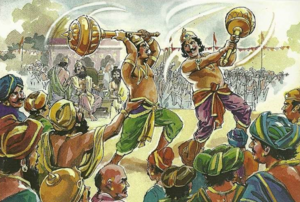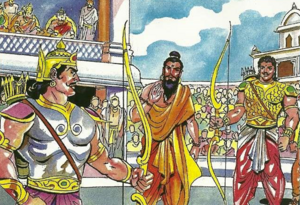Talk:The Hindu Values of Sportsmanship:Equality and Sports
By Vishal Agarwal and The Hindu Society of Minnesota
In daily life, we often see some individuals who have extra privileges due to their wealth, status or looks. But in the sports arena, everyone is equal irrespective of who they are in their normal day-to-day lives. There is no prince or commoner — everyone is a sportsperson with equal rights, duties and privileges so that the playing field is level. The following story from the Mahābhārata depicts the attempted exclusion of a remarkable archer Karṇa because he was just a charioteer’s son and wanted to participate in a competition of royal princes.
The Graduation Party of Kaurava and Pāṇḍava Princes
The royal family of Hastināpura organized a big event inviting all the citizens to celebrate the graduation of the Kaurava and the Pāṇḍava princes. All the students demonstrated their skills with different types of weapons.
Yudhiṣṭhira won the title of the best charioteer during the contest between the princes. A mace-duel was held between Bhīma and Duryodhana. But unfortunately, the two cousin brothers became so intense in their competition that people thought that one of them would get killed by the other. Finally, the two of them had to be separated forcibly by Aśvatthāmā.
But the performance that drew the most applause was that of Arjuna with his bow and arrow. With his steady aim, he could send the arrows wherever he wished. With one arrow, he created a stream of water. With another, a dazzling streak of lightning in the sky!
Suddenly, a stranger showed up at the entrance of the stadium and he challenged the princes to a contest. The stranger was none other than Karṇa, and he bowed at Droṇācārya, who had rejected him as a student earlier. Karṇa easily defeated Yudhiṣṭhira in chariot riding, and Bhīma in a mace duel. Then, he asked for a match between him and Arjuna alone. It became clear very soon that he was an equal — if not a better archer — than Arjuna.
When Kuntī saw Karṇa, she could figure out that he was none other than her own eldest son, whom she had abandoned earlier. She got so emotional that she fainted. It appeared that Karṇa would defeat all the princes in military skills. This would be a great insult to the royal family of Hastināpura, and also to Droṇācārya and Kṛpācārya because they were the teachers of the defeated princes.
Therefore, the teachers decided to eliminate Karṇa from the contest. Kṛpācārya announced, “This contest is only for princes. If Karṇa is a prince of some country, then he should tell us where he is from. Otherwise, he cannot participate in this contest!”
Now, Karṇa was in a fix, because he was only a charioteer’s son. So he merely muttered, “I am from the country of Aṅga.” (Today, Aṅga forms a part of the state of West Bengal in India). Duryodhana, who hated the Pāṇḍavas, thought that it would be very useful to make Karṇa his friend. Therefore, he immediately got up and said, “Karṇa may not be from a royal family. But now he will become a king. As the prince of Hastināpura, I have control over the region of Aṅga. Now, I will make Karṇa the king of Aṅga. He is therefore our equal now and he can participate in a contest against Arjuna.”
Bhīma intervened, “Princes can compete only with princes. There is no way Arjuna will compete with a commoner like Karṇa even though you have just made him the king of Aṅga.”
Duryodhana countered him and replied, “A hero is one who is brave and courageous — not one just because he is born in a royal family. Many great Ṛṣis and heroes have come from humble families. All great rivers start as a small trickle of water.”
Duryodhana’s response to Bhīma was correct, but we must not forget that he made friends with Karṇa only to use him against the Pāṇḍavas. In those times, Aṅga was a useless territory that had only forests and wild animals. Therefore, ‘King of Aṅga"’ was by and large a hollow title for Karṇa. Duryodhana immediately had a ceremony performed to declare Karṇa as the king of Aṅga.
Adhiratha, the humble charioteer father of Karṇa, could not control himself. He ran from the spectator stands and fell at the feet of Duryodhana in gratitude for what he had done for his son. Karṇa also bowed to his father to offer respects. Now everyone knew that Karṇa was the son of a charioteer.
INSIGHT: Although the society and even Bhīma, Kṛpācārya and Droṇācārya looked upon Karṇa as an inferior person because he was the son of a charioteer, we read later in the Mahābhārata about two noble charioteers — Sañjaya, and none other than Kṛṣṇa, who became the charioteer of Arjuna in the war. Vedavyāsa granted a divine vision to Sañjaya and this enabled him to listen to the Bhagavad Gītā, and to see the war first-hand.
Most of our scriptures called the Purāṇas were narrated to Ṛṣis by a member of the charioteer (Sūta) community. Even the version of the Mahābhārata that we study today was given its present form by a charioteer named Ugraśravā. This shows that our Ṛṣis have always accepted the fact that all human beings are equal and it does not matter what profession one follows as long as we follow the path of dharm. The example of Kṛṣṇa becoming the charioteer of his friend Arjuna shows that Bhagavān does not consider any work as lowly either.


